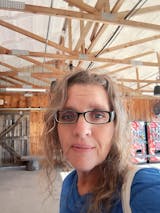
What Is An Herbalist?

What is an herbalist?
An herbalist is someone who practices the science and ancient healing techniques of The Plant Kingdom. Using plants, seeds, barks, flowers, roots, rhizomes, berries, and mushrooms; herbalists tend to have a unique point of view in regards to healing compared to other modalities of care.
Herbalists seek to address each person as a whole: mind (emotional), body (physical), and spirit (spiritual). A physical illness may have manifested in your physical body by years of emotional distress. Therefore knowledgeable herbalists get to know their clients on a deep and personal level in order to better comprehend how they got to their current state of being.
The allopathic system has been shown to be life saving in extreme cases, but in turn, has created a burden of responsbility in regards to our health. As our health is now on the shoulders of the health care provider and pharmacist, rather than the individual seeking care. Therefore creating a system of "disease care/ disease management" instead of health care.

Did you know?
But did you know that there is no Government board or state agency that regulates and certifies herbalists in the United States? Our friends at Evolutionary Herbalism stated that this can actually be a blessing to the herbal community. Which I agree with. "This is in certain ways a blessing, because there is no governmental body telling us how to (and how not to) practice herbalism."
The slight disadvantage for you?
Unfortunately, because there are no certifications or licensing boards anyone can claim the title "certified/clinical herbalist," regardless of how little training they have aquired. This is something I tend to see quite often, especially on social media platforms such as Instagram and Tik-Tok.

What kind of herbalists are there?
The Clinical Herbalist -
Clinical herbalism is a more specialized practice of herbalism which requires professional education with specific clinical application and training. In general, clinical herbalism programs focus on the study of anatomy, basic biochemistry and phytochemistry, traditional uses of herbs, herbal formulation, specific diseases and imbalances, symptom pattern assessment, and clinical tools for supporting wellness with herbs. Note that there are several different educational formats and titles associated with becoming a certified clinical herbalist depending on where you study and what country you live in. (American Herbalists Guild)
The Community Herbalist -
Community herbalism is largely focused around traditional folk preparations and historical uses of herbs, but of course is also informed by modern uses and research. Common backgrounds of study in Western herbalism include Native American, eclectic, wise woman, earth-centered, and folk, among other traditions. Community herbalists can be trained through traditional or non-traditional methods such as self-study or apprenticeships. (American Herbalists Guild).
The Folk Herbalist -
A folk herbalist practices herbalism based on traditional and empirical methods. This type of herbalism is generally associated with a specific culture or particular geographic bioregion and may include indigenous cultures, or erborista nativo (Italian for native herbalist). Knowledge of folk herbalism is generally passed down from one generation to the next. When a folk herbalist lives within the community, they can also be called a community herbalist or village healer.
How to choose an herbalist?
So where can you get advice you can trust? The closest equivalents to pharmacists in the herb industry are professional herbalists who have spent years studying and using the plant medicinally, but while pharmacists and doctors must meet a uniform set of licensing requirements set by a governing board, no such governing body certifies herbalists. This means that checking the credentials of an herbalist may take a little digging, but it's important to do.
When you talk to a pharmacist in a drugstore, you can be pretty confident you're dealing with a professional who has taken rigorous courses on the medicines he or she is licensed to dispense. But when you're looking for herbal supplements, the situations can be much different. The clerk at the counter of a health food store is probably just as willing to give you advice, but many such employees know little about the uses and risks of the herbs they recommend or sell.
"An informal WebMD survey of health store clerks found that their training ranged from a 12-week course to none at all. That's typical of those who sell herbs", says Mindy Green, a founder of the American Herbalists Guild.

Questions to ask your herbalist?
- Did you attend any accredited or non accredited schools for herbalism?
- How long were your herbal studies for?
- What herbal courses did you study?
- Do you continue your education and stay up to date with the latest information?
- Why did you choose herbalism compared to other systems of healing?
- What are three of your favorite medical herbal text books?
- Name three herbalists that came before you who inspired you to join this community of healers?
Things to remember -
A good herbalist is willing to work with others in the medical field, says Telkes. "If they can't help you in the best way possible, can they find you someone who can?" Beware of herbalists who make disparaging remarks about other healing professions. "It's not about competition; it's about making you well."
- You may ask if your herbalist belongs to the American Herbalists Guild. To become members, herbalists must submit three letters of reference from other professional herbalists, a description of their training and an account of at least four years of experience working with medicinal herbs.
- Herbalists come from many different traditions (Western, Native American and traditional Chinese medicine, to name three), which makes it difficult to set criteria. "Any time the guild tries to set some minimum standards for who can call themselves an herbalist, they run into problems," says Rob McCaleb, president of the Herb Research Foundation in Boulder, Colorado. "There are just too many schools of herbalists."
- The truth is, there is currently no certifying agency or licensing board for herbalists in the United States—and therefore no such thing as an herbal certification or professional title (such as Master Herbalist or Certified Herbalist) read more here.
- Unfortunately, there are many who claim this title, which simply doesnt exist, or worse; could get them into some serious trouble. There is still much confusion over who gets to claim this title. A Western medical doctor, naturopathic doctor, acupuncturist, or even a homeopath, are not certified herbalists (because the state board does not exist). Yes, even with that (medical) degree in hand, you still will not receive an official title or certification as a Certified Herbalist! You can however become a Registered Herbalist through the AHG.
Ready to take your healing into your own hands and work with an herbalist?
If you are ready to take your health into your own hands and work with an herbalist, or if you have anymore questions regarding a consultation, or custom herbal preparations, you can use the contact form on the website to email me directly.

refrences:
Herbal Certification: Understanding How to Become an Herbalist (theherbalacademy.com)
Legal and Regulatory FAQs | American Herbalists Guild
The Truth About Herbal Certification | Chestnut School of Herbal Medicine (chestnutherbs.com)
Legal Concerns of Practicing Herbalism - The School of Evolutionary Herbalism

